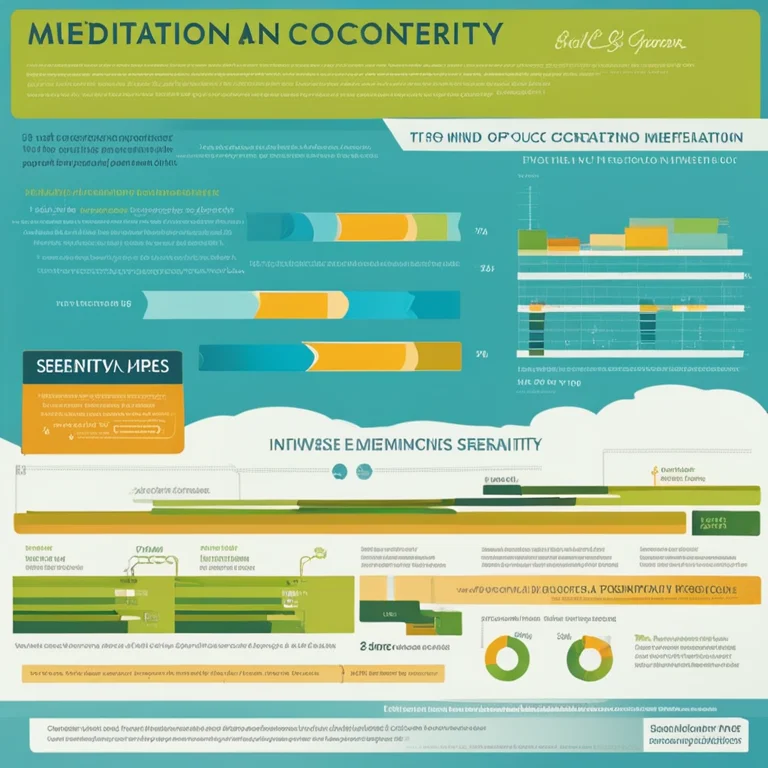
The Role of Meditation for Mind and Body
Discover how incorporating meditation into your daily routine can enhance your mental clarity, emotional health, and overall well-being.
article by Hina Kurosawa
Meditation's Rise in Popularity
Meditation has garnered significant attention in the wellness sphere, evolving from an ancient practice to a modern health essential. Trends show meditation's adoption is steeply rising. Meditation apps now boast millions of downloads, and corporations have begun integrating mindfulness programs for employee well-being. This quiet revolution reflects a growing recognition of meditation's profound benefits, which span from stress reduction to enhanced cognitive function. As of 2024, meditation is no longer a niche interest but a cornerstone of lifestyle optimization.

Stress Reduction and Mental Health
At its core, meditation is an effective antidote to stress. Consistent practice helps in managing anxiety and depression, conditions that have seen a concerning uptick in recent years. Neuroscientific research supports that meditation can shrink the stress-response area in the brain, while bolstering regions associated with self-awareness and emotional regulation. This physiological change is key to understanding meditation's impact on mental health, offering a non-pharmacological approach to enhancing mental resilience.

Improving Concentration and Productivity
Meditation's apparent simplicity belies its impressive effects on the mind's ability to focus. In an age where information inundation is the norm, the ability to concentrate has become a valuable commodity. Studies point towards meditation improving attention span, with long-term practitioners demonstrating greater concentration and memory skills. These benefits have tangible impacts on productivity, potentially revolutionizing occupational performance as more individuals and companies adopt mindfulness practices.

Cultivating Emotional Balance
Emotional health has taken center stage in discussions about overall well-being. Meditation is pivotal in nurturing emotional balance, fostering an environment where individuals can cope with life's ups and downs more effectively. It isn't about numbing emotions but rather experiencing them with a sense of detachment and control. This harmonizing effect can lead to deeper interpersonal relationships and a more fulfilling life experience, as seen in communities where meditation is a communal activity.
Enhancing Self-Awareness and Personal Growth
Self-awareness is fundamental to personal development, and meditation serves as its incubator. It allows practitioners to introspect, recognize habits and thought patterns, and initiate meaningful changes. In the future-focused world of 2024, the role of self-awareness in achieving personal and professional goals is clear. As meditation helps clear the mental clutter, it paves the way for a deeper understanding of oneself and one's place in the world, aligning with the broader pursuit of self-actualization.
Physical Health and Longevity
Meditation's realm of influence extends to physical health, with evidence linking it to decreased blood pressure, improved immune function, and mitigation of chronic pain. These health benefits contribute not only to a better quality of life but also to longevity. Lifestyle diseases, a major concern of modern times, can be combated with the inclusion of such mindful practices. Thus, meditation emerges as a holistic ally, enhancing both physical vitality and mental vigor as we navigate the complexities of contemporary living.
Published: 1/9/2024
Modified: 1/9/2024
More predictions
Come back here soon to learn more about yourself and your future


The Serenity Sojourn: Embrace a Meditation Retreat
Delve into the tranquility of a meditation retreat and rejuvenate your mind, body, and soul with practices that transcend time.


The Tranquil Bridge: Meditation's Impact on Sleep Quality
Discover how meditation can enhance sleep quality, weaving a path to better rest and well-being


The Serene Path: A Guide to Meditation Retreats
Discover the transformative journey of meditation retreats and how they can enhance your spiritual practice in a serene environment.